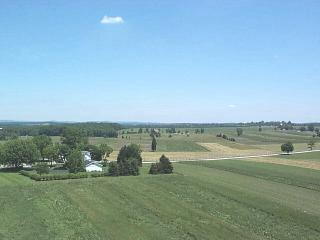
Just before noon the command structure of the Third Corps decided that is was time to see what was in the woods in their front along Seminary Ridge. This kind of reconnaissance would normally have been the job of the cavalry, but they had been pulled out. With Sickles approval four companies of the 1st US Sharpshooters and the 3rd Maine Regiment all under the command of Colonel Hiram Berdan began the reconnaissance. As they moved north through the trees Berdan saw enemy skirmishers in front of a large force. Berdan had a captain report what they had seen to Third Corps headquarters, with the instructions, "I want you to ride casually to the rear and when you are out of sight of the enemy... ride like hell!" Berdan deciding that he commanded a force strong enough to make a fight, did so.

Looking north along the Confederate line on Seminary Ridge.
What Berdan saw was the Tenth and Eleventh Alabama Infantry regiments that were protecting the right of Anderson's division. Berdan shouted from his grey horse, "Follow me, advance firing." With their rifles crackling and smoking Berdan's men drove the Alabama skirmishers back to their main line. The Eleventh Alabama Regiment which was out in the open received galling fire into their flank from the Sharps breachloader equipped Yankees. Unsuccessful in their attempt to change front to meet Berdan's boys, the Alabamian's survival instinct took over and they hightailed it out of there. Berdan's men were "mad with success" and hot on their heels until the Eleventh Alabama passed through the Eighth Alabama regiment. The sharpshooters unwisely rushed into the open and the Eighth Alabama, now joined by the Tenth Alabama, poured a crashing volley into Berdan's men that quickly drove them back to the trees. The two Alabama regiments pressed Berdan's men hard. Seeing that he was at a disadvantage Berdan ordered his bugler to call the retreat and they fell back firing.
With the lack of concern about his situation from Army headquarters and now the report from Berdan, that there were enemy forces off to his left and front, Sickles now felt that he had to take matters into his own hands. He ordered Birney's division forward just after noon to occupy the left and center of the line that he had showed to Hunt. Sickles later wrote; "It was not through any misinterpretation of orders. It was either a good line or a bad one, and, whichever it was, I took it on my own responsibility... I took up that line because it enabled me to hold commanding ground, which, if the enemy had been allowed to take - as they would have taken it if I had not occupied it in force - would have rendered our position on the left untenable; and, in my judgment, would have turned the fortunes of the day hopelessly against us."
Depending on whose version of the history of this battle you read Sickles is either a hero or a fool. General Sickles recalled the Battle of Chancellorsville where he held the high ground while the rest of the Army of the Potomac retreated in a rout. He was ordered off that high ground then, with disastrous results for the army. Perhaps Sickles greatest sin is that he did not coordinate this salient with the commanding general and the rest of the Army of the Potomac.
|
 |
|
 |

